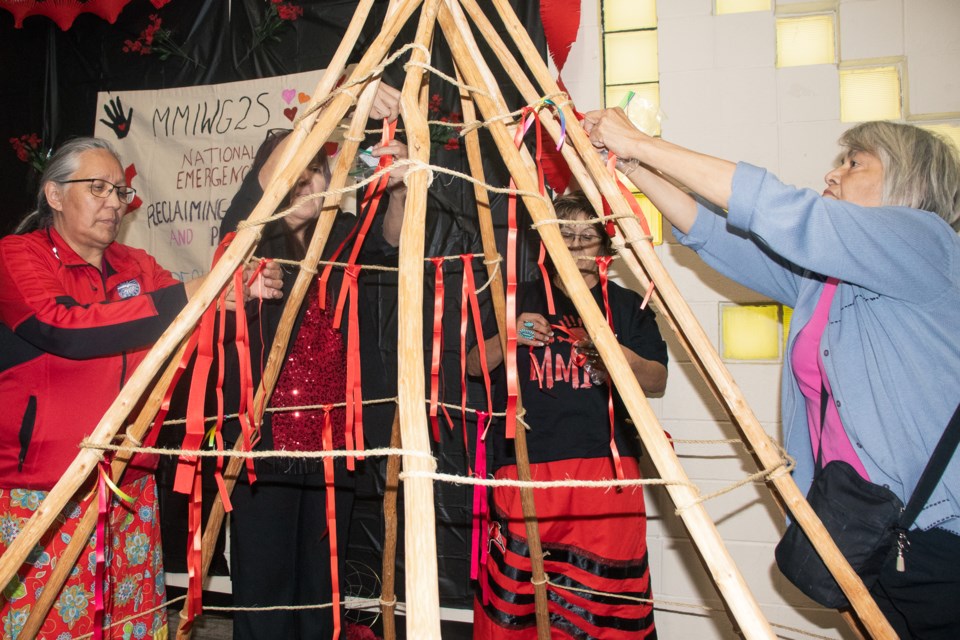ST. PAUL – The Mannawanis Native Friendship Centre (MNFC) honoured missing and murdered Indigenous women, girls, and two-spirit people (MMIWG2S) on May 5.
The annual commemoration serves not only as a tribute to those lost but also as a platform to raise awareness about the ongoing crisis faced by Indigenous communities, said Desiree McCarthy, gender-based violence facilitator at the MNFC.
But beyond raising awareness, McCarthy said the MNFC is also actively working on initiatives to help address the crisis, including developing a database for missing and murdered individuals.
Developing an MMIWG2S database
She explained a database serves as a crucial tool for advocacy, education, and learning the root causes of the crisis.
Executive director Tanya Shaw explained that by having concrete data, community organizations and policymakers can make informed decisions regarding resource allocation, program development, and interventions aimed at preventing violence and supporting affected families.
According to Shaw, the initiative came together thanks to the MNFC’s previous director Hinano Rosa, as well as the late Elder Irene Pollom, and the MNFC has been working with other partners for the project.
Métis Elder Linda Boudreau-Semaganis is among them. She’s a senator with the National Association of Friendship Centres (NAFC) representing Alberta.
Boudreau-Semaganis said the data she has been sharing with the MNFC is gathered by the Les Femmes Michif Otipemisiwak (LMFO), who she has been working with for many years.
The LMFO has been forming their own database, due to the lack of any official database to help with the cause, said Boudreau-Semaganis. She anticipates thousands of MMIWG2S across Canada, which increases every passing day. But according to Boudreau-Semaganis, collecting data on this is not a priority for the government.
“And if we don't keep accurate data, then we have a very difficult time to establishing programming to remember those that are lost, but also to develop preventive programs and information that people can use to educate the younger women,” she added.
Manual
In addition to the database, McCarthy explained the MNFC is also working to create a gender-based violence manual aimed at training community members, staff, and schools on various forms of violence.
Creating the manual takes a lot of work, she said. “We do interviews with people for their stories to address and identify any gaps in our communities,” McCarthy explained. “Maybe there are flaws in transportation, and maybe there are beliefs that lead to violence.”
Shaw added, “The manual is also supposed to increase understanding of our people and our ways as well,” especially understanding to the First Nation people’s way of knowing and being.
Shaw hopes this will help partnering service-delivery organizations like the RCMP, Victims Services, women’s shelters, and the municipal government, whom people usually approach for help.
“It’s just another way to bridge relationships, and understand how we can, as a town, support everybody who comes and access the services we provide,” she said.
Speaking of partnerships, the MNFC also established memorandum of agreements (MOU) with community organizations, according to McCarthy. “They’re agreements saying . . . we can collaborate together, [and] we can share space.”
More support is needed
The MNFC continues to support families of MMIWG2S, in addition to helping vulnerable women in the region the best way it can, but it can only do so much due to lack of resources, said program manager Gail Collins.
The families of MMIWG2S, as well as murdered or missing men, for example, have difficulties navigating the justice system while already dealing with grief and loss, Collins said.
As for women, she said there are many vulnerable Indigenous women in northern Alberta, with many systemic issues contributing to their vulnerability, such as domestic violence, poverty, and the lack of housing.
She believes a central hub where they could go to for help would help address the crisis, suggesting community organizations like the MNFC are already stretched thin.
At the MNFC, for example, roughly a thousand individuals come in for help every month. “They come here because they feel safe,” she said. “They have no clothing, and they lack the basic things that we take for granted.”
But then again, there is a lack of resources, she added. “It’s funding we need. More staff. We need more resources. We need more partnership and collaboration because we’re up against a lot of barriers,” said Collins.
Collins still encourages people to come to the MNFC if they need help, and the organization will do its best to help, or refer them to other partnering organizations if need be.



